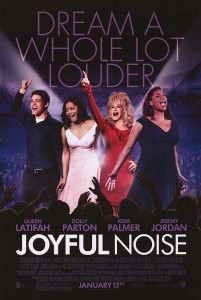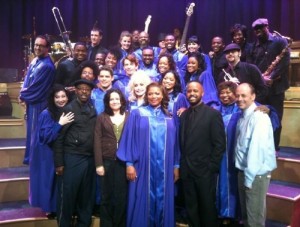Joyful Noise
Posted on January 12, 2012 at 7:00 pm
B+| Lowest Recommended Age: | High School |
| MPAA Rating: | Rated PG-13 for language including a sexual reference |
| Profanity: | Some strong language |
| Alcohol/ Drugs: | Drinking |
| Violence/ Scariness: | Tense family confrontations, bullies, brief fight, gun, sad deaths |
| Diversity Issues: | Diverse characters including disabled character |
| Date Released to Theaters: | January 13, 2012 |
| Date Released to DVD: | April 30, 2012 |
| Amazon.com ASIN: | B007HHWJSA |
Joyful indeed — this movie is pure cinematic sunshine, guaranteed to brighten the heart and gladden the spirit. Super-divas Dolly Parton and Queen Latifah play rival gospel choir leaders in an inspiring and heart-warming story filled with love, laughter, music, and praise.
G.G. (Parton) is still mourning the loss of her husband Bernard (Kris Kristofferson) when she receives another blow. She expected to take over his duties as choir leader but the church council picks Vi Rose (Queen Latifah) and her more traditional approach instead. Vi Rose’s husband is in the military and out of contact. She has to take on extra work to support Olivia and her son Walter (Dexter Darden), who has Asperger’s syndrome that makes social interaction difficult. She is devoted to the choir, a source of stability and connection for her. She wants it to be competitive but it is more important to her that it be clear that the focus is on the music as worship, not performance. When they get a chance at the national title — and a budding romance between G.G.’s grandson Randy (Broadway star Jeremy Jordan) and Vi Rose’s daughter Olivia (Keke Palmer of Akeelah and the Bee) — G.G. and Vi Rose will have to find a way to work together harmoniously. And that, after all, is what a choir is about.
Writer/director Todd Graff demonstrated in the underrated Camp and Bandslam that he understands teenagers as characters and works well with them as performers. His sincere and sympathetic appreciation for their stage of life is a pleasure to experience. Graff also understands the passion of those who love to perform before a live audience and the challenges they face. As an experienced theater nerd himself he knows how to stage musical numbers. And he is remarkably adept at managing a lot of characters and story lines gracefully, giving each element of the story its own dignity and spirit and sensitively evoking a touching sense of a small-town Georgia community hit hard by the economic upheavals of the past five years. I would have excised a not-very-comic sub-plot about one choir member’s difficulty finding a date after a man dies following their first night together. But the rest is skillfully blended with some sharp dialog. “You’re so country you’ve been married three times and have the same in-laws,” one character teases another. “Your train of thought makes all local stops,” says another.
Queen Latifah gives her best performance to date because Vi Rose is the most complex character she has played to date, giving her a chance to show her confidence, her humor, and her warmth. She shines in a terrific speech about what incandescent beauty really means and sings a moving “Fix Me, Jesus.”
Parton makes a welcome return to feature films after nearly two decades in a role as tailor-made for her as her fitted choir robes. G.G. is flashy and outspoken. But she, too, is trying to hold on in difficult times. She is estranged from her daughter and trying to care for her grandson. In a scene of piercing sweetness, she remembers her life with her husband in a tender duet that gently evolves into a trio.
Jordan and Palmer are enormously appealing, with a quiet chemistry that lights up the screen.
Parton’s three tuneful new songs are mixed with raise-the-roof adaptations of gospelized classics Paul McCartney’s “Maybe I’m Amazed” and Michael Jackson’s “The Man in the Mirror.” On stage and off, Graff shows us the characters’ kindness and sense of connection even when they frustrate each other and it feels very genuine. There is a lot of heart in the musical numbers that deepens our pleasure in seeing the characters find what the harmony they are looking for.



